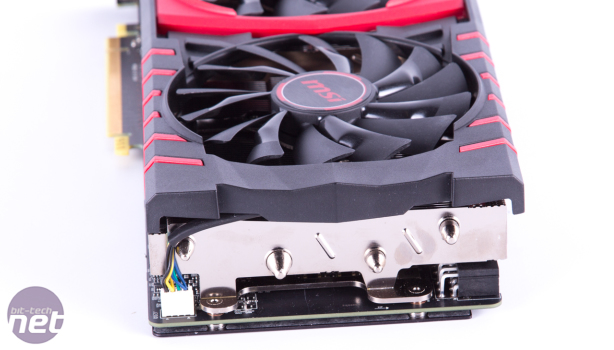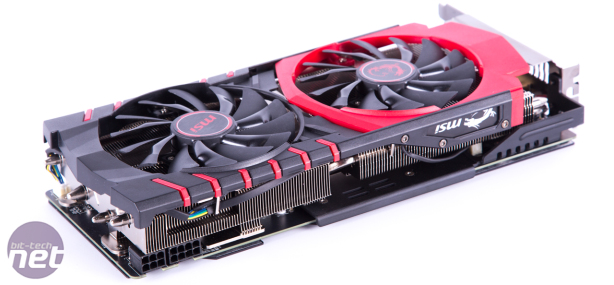Performance Analysis
The AMD Radeon R9 390X GPU is pitched as a competitor to the Nvidia GeForce GTX 980, although, with an MSRP of $430 compared to $480, the R9 390X can afford to be a little slower to remain competitive. MSI narrows the gap by deploying a factory overclock and our testing illustrates the MSI R9 390X delivers a competent showing against the GTX 980 in gaming performance.
Alien: Isolation reveals MSI's R9 390X Gaming 8GB graphics card to be just behind the reference Nvidia GTX 980, but that gap closes as the resolution increases with the MSI R9 390X eventually creeping into the lead at UHD, even if only by a few frames. The generational uplift over the R9 290X is apparent here, where a combination of a faster GPU core clock and much faster memory helps deliver well over an extra 10 per cent.
Battlefield 4 paints a similar picture to Alien: Isolation in that the MSI R9 390X gradually overtakes the Nvidia GTX 980 as the resolution increases. AMD touts the 8GB of framebuffer as ideal for 4K gaming but these results would point towards the MSI R9 390X being best suited for 1440p gaming to achieve playable framerates, at least if we're talking single-GPU configurations.

Crysis 3, being a memory bandwidth-intensive title, benefits greatly from the increase in memory frequency versus the previous generation R9 290X, seeing between 15 and 20 per cent performance improvements in average FPS. The MSI R9 390X struggles to deliver a smooth framerate at any resolution but the GTX 980 finds itself in a similar situation; Crysis 3 is merely a demanding title.
Grand Theft Auto V seems to favour Nvidia GPUs across the board and the MSI R9 390X is a fair way behind the GTX 980 at 1080p and 1440p, only at 4K does the gap narrow to an insignificant level. Importantly though, the GTX 980 has a significant chunk more overclocking headroom, on average, than the MSI R9 390X giving it much more capability, and it also manages this extra performance with a lot less power consumption.
Middle Earth: Shadow of Mordor is the first title where the MSI R9 390X starts off faster than the GTX 980 and, as you might expect from previous games, that lead increases as the resolution rises. Interestingly for gamers on a tighter budget the MSI R9 390X delivers a 4K experience in this title that's competitive with the GTX 980 Ti and R9 Fury X.
The last game in our testing suite, The Witcher 3: Wild Hunt, paints another promising picture for the MSI R9 390X. At 1440p and 4K this graphics card is competitive with the GTX 980 and shows sound generational uplift over its predecessor, the R9 290X. Unigine Valley, on the other hand, bucks the overall trend we've seen since this particular benchmark is tessellation-heavy and favours the more advanced geometry back-end of Nvidia's current GPUs, as opposed to the pixel-crunching prowess of AMD's GCN architecture.
Average FPS performance uplift for the MSI R9 390X compared to a stock-clocked AMD R9 290X is 13.3, 13.4 and 14.1 per cent for 1080p, 1440p and 4K, respectively. The same comparison to a stock Nvidia GTX 980 reveals that the MSI R9 390X is -6.3, -1.5 and 2 per cent different at 1080p, 1440p and 4K.
Power consumption is the Achilles heel of the MSI R9 390X Gaming with peak system power draw in the 500W region, compared to 360W for the GTX 980. That rather large power-consumption figure represents a significant jump over an R9 290X, too, likely a result of MSI's aggressive overclock as well as the increased capacity of faster video memory. Nvidia's GTX 980 is a clear winner when it comes to efficiency and performance but that isn't unexpected considering the difference in MSRPs between the two GPUs.

Higher power draw should translate into high temperatures but MSI's triple-slot cooling solution does a great job of keeping temperatures in the sub-80 degrees Celsius region. Idle temperatures appear higher than would be expected but this comes down to the "Zero Frozr" mode whereby the GPU cooling fans refrain from spinning as long as the temperature remains below 60 degrees Celsius. The load noise output of MSI's cooling solution is roughly equatable to Nvidia's GTX 980 Ti or Titan X, impressive given the huge power draw of the GPU.
Overclocking headroom is slim with the MSI R9 390X and most users will be lucky to eke out an additional 5 per cent on the core and memory. Most GTX 980s are able to be pushed an additional 15 per cent on average. The modest overclock does translate into some extra performance and power consumption, though thermals and noise remain largely unchanged.
Conclusion
MSI's R9 390X Gaming 8GB graphics card is a valiant attempt to make what is effectively a rebranded and tweaked R9 290X go that little bit further. Out-of-the-box performance is on par with Nvidia's GTX 980 at higher resolutions, particularly 4K, while cooling and acoustic performance is solid given the high power draw of the Grenada XT GPU. The updated Twin Frozr V cooling solution with a hybrid fan mode and backplate provide nice finishing touches but it's still a little disappointing to see MSI fail to adhere to the ideal dual-slot form factor.
At a price of £350 MSI's offering is similarly priced to all other R9 390Xs from AMD partners though MSI had the courage to ship with the most aggressive overclock on the memory and core giving this card a performance edge. As of early July, AMD R9 290X stock is still clearing through the channel at sub-£300 price points making the R9 390X, in general, a tough sell unless the extra VRAM is needed. Our inclination would be that you're more likely to run out of GPU horsepower before a 4GB framebuffer is filled, particularly at 4K. AMD would be wise to offer a more affordable 4GB R9 390X to ensure it maintains its price-to-performance edge over Nvidia.
MSI's R9 390X Gaming 8GB graphics card finds itself in an awkward market position. On the one hand MSI has done a solid job providing effective cooling, excellent performance and stylish aesthetics but on the other the relatively high price of the R9 390X, limited overclocking headroom and hefty power consumption make the R9 390X difficult to recommend against Nvidia's GTX 980 or even some highly-overclocked GTX 970s.
-
Value22 / 30
-
Features23 / 30
-
Performance36 / 40


MSI MPG Velox 100R Chassis Review
October 14 2021 | 15:04









Want to comment? Please log in.